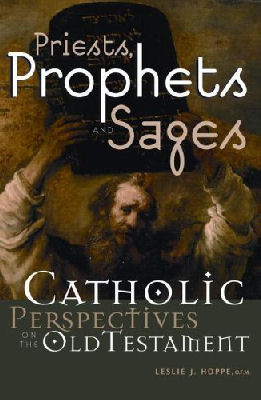
|
Posted May 12, 2006
Book: Priests, Prophets and Sages: Catholic Perspectives on the Old Testament Author: Leslie J. Hoppe, O.F.M. St. Anthony Messenger Press, Cincinnati, OH. 2006. Pp. 129 An Excerpt from the Jacket:
Scripture expert Leslie Hoppe addresses many commonly asked questions about the Old Testament. Each chapter includes questions for reflection and suggestions for further reading, making Priests, Prophets and Sages a valuable resource for personal or group Bible study. An Excerpt from the Book: The most characteristic form of divine-human communication in ancient Israel was through prophecy. In the mind of many Israelites, prophets were associated with foretelling the future. For example, when Saul searched for his father’s lost livestock, he consulted a “prophet” for help in find them. When Jehosphaphat of Judah and Ahab of Israel considered going to war with the king of Aram, they first consulted four hundred prophets who predicted victory and then, at Jehoshaphat’s insistence, they consulted one more who predicted defeat. An infallible sign of God’s rejection of Saul on the eve of a battle with the Philistines either through a dream, the urim and thummim, or through a prophet. Most Christians associate prophets with the call to repentance — primarily because of the way the liturgy uses readings from the prophetic books. The prophetic books, however, present the prophets as those entrusted by God to deliver a message to Israel. That message took two basic forms. The prophets first announced the consequences of the choices that Israel made. Israel chose not to maintain a society based on justice. People of means corrupted the judicial system in order to increase their holdings at the expense of the Israelite peasant. Priests presided over a liturgy that dulled people’s sensitivity to the injustices of the Israelite social and economic system. Instead of insuring that the peasants’ rights were protected, Israelite kings facilitated the growth of social inequity. In addition to social injustice, both Israelite kingdoms were guilty of compromising their ancestral religious traditions by failing to serve the Lord alone. The worship of foreign deities became all the rage and took place even within the confines of the temple itself. Prophets such as Amos, Hosea, Micah, Isaiah, Jeremiah and Ezekiel announced God’s judgment on Israel’s behavior. That judgment would be nothing less than the destruction of Israel’s political and economic system at the hands of foreign invaders, the loss of the land and the exile of the people. Israel’s religious institutions were not exempt from judgment. The Jerusalem temple was to be destroyed and its priesthood scattered. Table of Contents: Chapter 1: What Do We Call These Books? Chapter 2: What’s “In” and What’s “Out”? Chapter 3: What Does the Old Testament Say About God? Chapter 4: Israel — The Chosen People? Chapter 5: How Does God Speak? Chapter 6: Did All This Really Happen? Chapter 7: How Do We Find Meaning in the Old Testament? |
|
